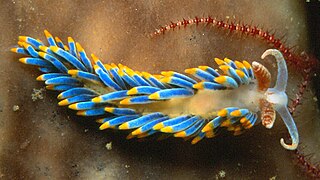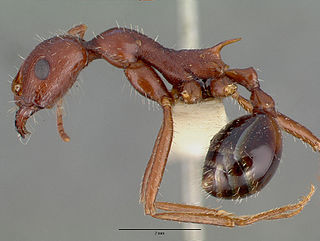
The Accademia di Belle Arti di Bologna is a public tertiary academy of fine art in Bologna, in Emilia-Romagna in northern Italy. It has a campus in Cesena.

Eubranchidae is a taxonomic family of sea slugs, marine gastropod molluscs in the superfamily Aeolidioidea, the aeolid nudibranchs.

Alfredo Trombetti, was an Italian linguist active in the early 20th century.

Doto is a genus of dendronotid sea slug, a nudibranch in the Family Dotidae. This genus feeds on hydroids, as reflected by its serrated radula.

Antonio Bertoloni was an Italian physician and botanist who made extensive studies of Italian plants. He also collected notable samples of Central American flora.
Giuseppe Bertoloni was an Italian botanist and entomologist.

Eubranchus is a genus of aeolid nudibranch in the family Eubranchidae.

Aplysiopsis elegans is a species of sacoglossan sea slug, a shell-less marine opisthobranch gastropod mollusk in the family Hermaeidae.

Berghia is a genus of sea slugs, aeolid nudibranchs. They are shell-less marine gastropod molluscs in the family Aeolidiidae. They are covered in cerata which give them their unique tentacle look and color. Berghia are commonly found in shallow waters and their diet consists of strictly Aiptasia Anemone. This genus is now commonly used commercially to fight off Anemone populations in fish tanks.
Giovanni Giuseppe Bianconi, sometimes J. Josephi or Joseph Bianconi, was an Italian zoologist, herpetologist, botanist and geologist.

The Academy of Sciences of the Institute of Bologna is an academic society in Bologna, Italy, that was founded in 1690 and prospered in the Age of Enlightenment. Today it is closely associated with the University of Bologna.
Accademia often refers to:

Antonio Fais was an Italian mathematician and railway engineer. He was rector at the University of Cagliari from 1897 to 1898.

Salvatore Trinchese was an Italian zoologist who specialised in Mollusca.
Elephantopus elatus, common name tall elephantsfoot, is a North American species of flowering plant in the sunflower family. It is native to the southeastern United States from eastern Louisiana to South Carolina.

Novomessor is a genus of ants that was described by Italian entomologist Carlo Emery in 1915. Until recently, the genus was thought to be a synonym of Aphaenogaster, but a 2015 phylogenetic study concluded that the two genera were distinct, reviving Novomessor from synonymy. Three species are currently described. This genus is known to inhabit the deserts of southwestern United States and Northern Mexico.
Eubranchus capellinii is a species of sea slug or nudibranch, a marine gastropod mollusc in the family Eubranchidae. It has been suggested that it is the same species as Eubranchus doriae and that this name should take precedence.
Capellinia doriae is a species of sea slug or nudibranch, a marine gastropod mollusc in the family Eubranchidae.
CavaliereCarlo Antonio Fornasini was an Italian ivory trader and amateur field naturalist who worked in Mozambique. He collected numerous specimens of animals, insects and plants, and presented them to the Academy of Sciences of the Institute of Bologna in his home city for scientific study. He is remembered for having had during his lifetime several taxa named in his honour.

Cavaliere dottoreCarlo Fornasini was an Italian micropalaeontologist who specialised in Foraminifera ('forams'). He was a pioneer in using fossil forams to sequence marine sedimentary deposits by their relative dates; a technique called biostratigraphy.











